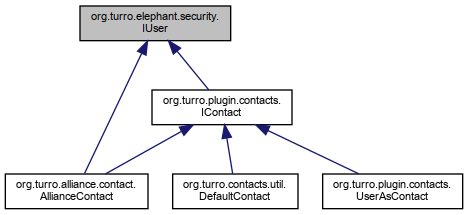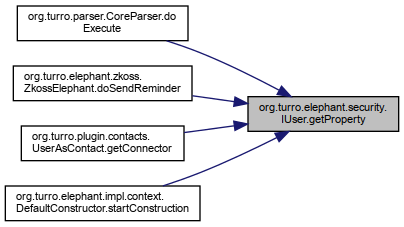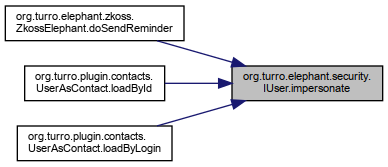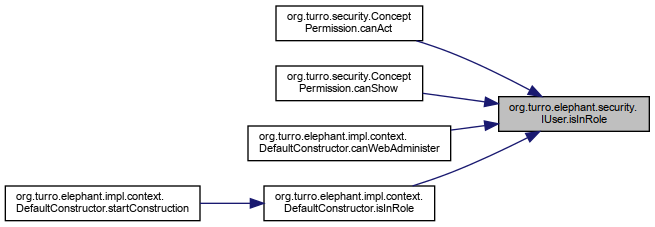
Public Member Functions | |
| boolean | validate (String login, String password) |
| boolean | validate2 (String password2) |
| boolean | impersonate (String login) |
| boolean | impersonateByEmail (String email) |
| void | reload () |
| boolean | isThisUser (String id) |
| String | getProperty (String key) |
| boolean | isInRole (String role) |
| boolean | hasAnyRoleKey (String role) |
| boolean | equals (Object obj) |
Static Public Attributes | |
| static final String | CONNECTOR_EMAIL = "Email" |
| static final String | CONNECTOR_TRADE = "TradeName" |
| static final String | CONNECTOR_FISCAL = "FiscalName" |
| static final String | CONNECTOR_EMAIL_LOGIN = "EmailLogin" |
| static final String | ADDRESS_FISCAL = "Fiscal" |
| static final String | LOGGED_USER = "xp_user" |
| static final String | INTERNAL_SIGNIN = "InternalSignIn" |
IUser should be implemented by in user management implementations. IConstructor expects an IUser where to check whether a user is in role.
Definition at line 25 of file IUser.java.
| boolean org.turro.elephant.security.IUser.equals | ( | Object | obj | ) |
Implemented in org.turro.alliance.contact.AllianceContact, and org.turro.contacts.util.DefaultContact.

| String org.turro.elephant.security.IUser.getProperty | ( | String | key | ) |
| key | Attribute's key. |
Implemented in org.turro.alliance.contact.AllianceContact, and org.turro.contacts.util.DefaultContact.

| boolean org.turro.elephant.security.IUser.hasAnyRoleKey | ( | String | role | ) |
Implemented in org.turro.alliance.contact.AllianceContact, and org.turro.contacts.util.DefaultContact.

| boolean org.turro.elephant.security.IUser.impersonate | ( | String | login | ) |
| login | User login. |
Implemented in org.turro.alliance.contact.AllianceContact, and org.turro.contacts.util.DefaultContact.

| boolean org.turro.elephant.security.IUser.impersonateByEmail | ( | String | ) |
Implemented in org.turro.alliance.contact.AllianceContact, and org.turro.contacts.util.DefaultContact.

| boolean org.turro.elephant.security.IUser.isInRole | ( | String | role | ) |
Usually this method should take this form:
if(user.isInRole("page:edit")) {
// edit page
}
| role | Role to check. |
Implemented in org.turro.alliance.contact.AllianceContact, and org.turro.contacts.util.DefaultContact.

| boolean org.turro.elephant.security.IUser.isThisUser | ( | String | id | ) |
Implemented in org.turro.alliance.contact.AllianceContact, and org.turro.contacts.util.DefaultContact.

| void org.turro.elephant.security.IUser.reload | ( | ) |
Implemented in org.turro.alliance.contact.AllianceContact, and org.turro.contacts.util.DefaultContact.

| boolean org.turro.elephant.security.IUser.validate | ( | String | login, |
| String | password | ||
| ) |
| login | User login. |
| password | User password. |
Implemented in org.turro.alliance.contact.AllianceContact, and org.turro.contacts.util.DefaultContact.

| boolean org.turro.elephant.security.IUser.validate2 | ( | String | password2 | ) |
| password2 | User password2. |
Implemented in org.turro.alliance.contact.AllianceContact, and org.turro.contacts.util.DefaultContact.
|
static |
Definition at line 31 of file IUser.java.
|
static |
Definition at line 27 of file IUser.java.
|
static |
Definition at line 30 of file IUser.java.
|
static |
Definition at line 29 of file IUser.java.
|
static |
Definition at line 28 of file IUser.java.
|
static |
Definition at line 33 of file IUser.java.
|
static |
Definition at line 32 of file IUser.java.